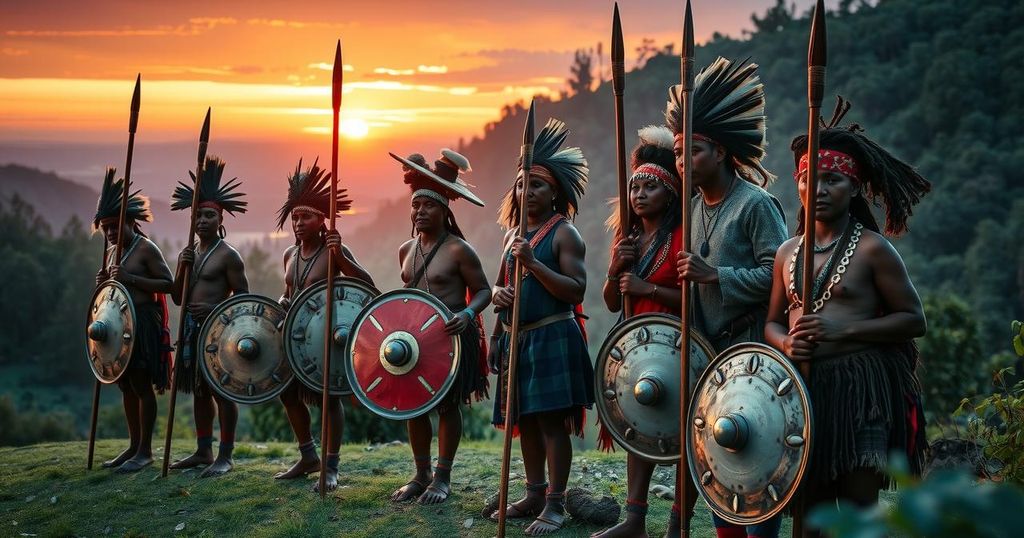Evo Morales, former Bolivian president, remains a powerful figure in the Tropico de Cochabamba, despite facing allegations related to a minor. With a stronghold in Lauca Ene, he plans to announce a bid for a fourth presidential term, defying a court-imposed limit. Supporters express discontent with current governance, indicating potential unrest if he is denied candidacy.
As night descends upon Lauca Ene, a remote village in central Bolivia, around 500 Indigenous supporters gather, uplifted by chants of “Long live Evo Morales!” Here, the former Bolivian president, admired in this coca-rich area, continues to hold significant authority, with any entry into the village requiring his consent. From this stronghold, Morales projects his influence across the Tropico de Cochabamba region, known for its lush forests and nourishing rivers, which is home to over 260,000 residents.
Morales, who is now 65, built his political career amidst the struggles of coca growers in the 1980s, becoming Bolivia’s first Indigenous president from 2006 until his resignation in 2019. Even now, he has a striking ability to mobilize his loyal followers, particularly in a town where he has been hiding out for seven months to avoid an arrest warrant. This warrant, related to accusations of trafficking a minor, was briefly annulled but then reinstated by a judge.
The allegations stem from an alleged relationship with a minor that dated back to 2015, during his presidency, and a purported child fathered the subsequent year. Morales has adamantly denounced these charges, branding them as attempts at “judicial persecution.”
The police and military forces seem to respect the boundaries of Lauca Ene, with no attempt to confront the spear-carrying coca growers who stand guard at the makeshift barricades. “We will remain here until our brother Evo Morales is back in the presidency,” declared Willy Alvarado, a local farmer.
Meanwhile, while the rest of the region maintains a sense of normalcy with functioning clinics and government offices, Lauca Ene depicts a different picture. Here, Morales loyalists monitor the roads day and night, maintaining a protective watch. Morales, in casual attire, met with an AFP journalist in his humble office, dismissing the court-imposed two-term limit. He expressed confidence that officials would likely accept his candidacy.
On May 16, he plans to travel the 300 miles to La Paz, accompanied by his supporters, to register for what would be a potential fourth term. Morales has warned that any rejection from election officials could incite widespread protests among his Indigenous base, reminiscent of previous tumultuous uprisings. Zenobia Taboada, a local farmer, echoed this sentiment, asserting, “If they touch brother Evo, the people will come out right away.”
Morales operates from a three-story building in Lauca Ene, where he engages daily with farmers, laborers, and politicians. Supporters reside nearby in makeshift accommodations and share meals from communal pots, ensuring a robust network of loyalty. Vicente Choque, a coca grower aligned with Morales, shared that groups take turns manning the barricades and maintaining a constant presence regardless of weather conditions.
A group at the Lauca Ene entrance uses their spears to block the road, discouraging any unapproved visitors. The barricade, overgrown with grass, reinforces the notion of a community standing firm in its resolve. Zenobia Andia, who traveled a considerable distance to uphold her guard, expressed dissatisfaction with the current president, Luis Arce, whom she believes has failed in managing the ongoing economic crisis. “We had reached the peak, and now we find ourselves back at the bottom. We just want to recover what we had,” Andia lamented, contrasting the leadership of Morales with Arce’s effectiveness.
Amidst a landscape defined by both loyalty and ambition, Morales’s supporters persist in their calls for a return to power, foreshadowing potential disruptions in the lead-up to upcoming elections.
Evo Morales remains a powerful figure in Bolivian politics despite facing significant legal challenges. His stronghold in Lauca Ene serves as a backdrop for his ambitions to secure an unprecedented fourth presidential term. With his loyal supporters rallying behind him, the socio-political climate could become tense in the lead-up to the elections, especially considering the frustrations with the current government. Morales’s narrative of political persecution and promises to recover past glory resonate deeply among his followers, reflecting broader discontent within Bolivia. The intersection of loyalty, economic struggles, and political aspiration paints a complex picture for Bolivian society as Morales seeks to return to the forefront of its leadership.
Original Source: www.kten.com




